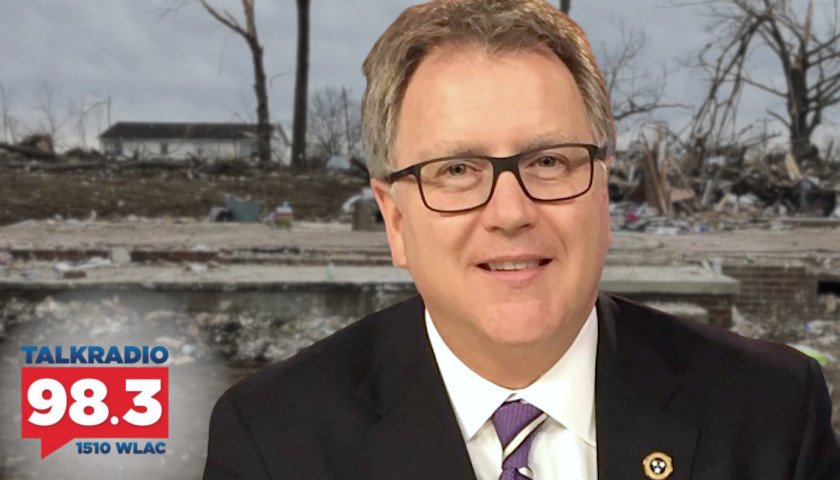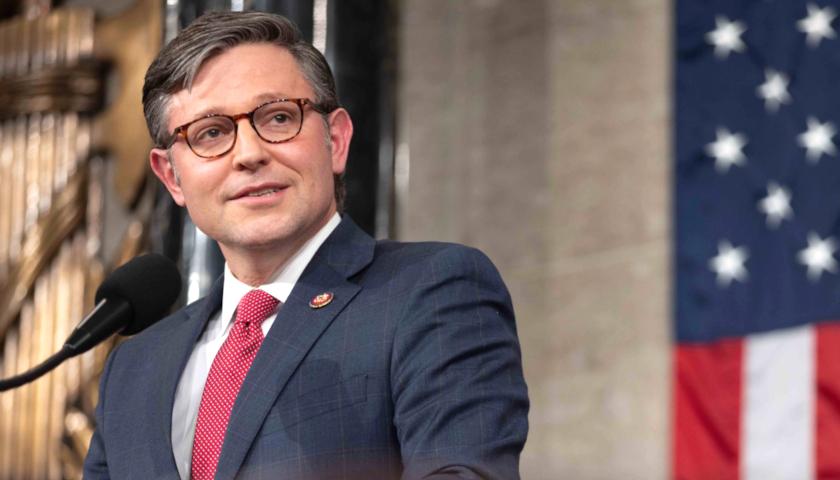On Tuesday’s Tennessee Star Report with Michael Patrick Leahy – broadcast on Nashville’s Talk Radio 98.3 and 1510 WLAC weekdays from 5:00 a.m. to 8:00 a.m. – Michael Patrick Leahy welcomed his weekly regular Tuesday guest and All-Star Panelist, Tennessee State Senator Kerry Roberts (R-Springfield.)
During the second hour, Roberts explained how President Trump was impressed with how quickly Tennessee volunteers came to the relief of many who suffered devastating losses in the aftermath of the tornado that struck Nashville and Middle Tennessee last Tuesday.
He brought up an issue he saw within some of Tennessee’s jurisdictions citing that first responders’ are structured in a “patchwork” system instead of a single coordination which is ineffective and should be looked at.
Leahy: I am delighted to have in studio with us this morning, our All-Star Panelist, State Senator Kerry Roberts. Good morning Kerry
Roberts: Good morning, how are you this morning?
Leahy: I’m delighted to have you here because reporting on the coronavirus and other things is making me a little bit irritable. (Laughs)
Roberts: Depressed or irritable?
Leahy: No-no-no. I never get depressed. I guess irritable or unsettled. We’ll talk about that in a second. Primarily because finding out all the information and what’s the proper course of action.
And without that proper information which I think we’re short on, it is hard to make good decisions. But we’ll get to the coronavirus in a minute. It’s going to be there for some time. It’s going to be there for some time. I’m reminded which is why it’s a pleasure to have you in the studio today.
Roberts: Today.
Leahy: Because a week ago today.
Roberts: It was a week ago, right.
Leahy: I’m coming in at 5 o’clock and I’m listening and all of a sudden I hear that tornadoes are touching down because I missed it. The weather was a little bit rough coming in. I thought, hmm that’s interesting. The tornadoes touched down early Tuesday morning and of course, there was a large loss of life and a huge loss of property. You were supposed to be in here last week.
Roberts: Right.
Leahy: You texted me…
Roberts: So I got up at the normal time which I don’t have to get up as early as you since I’m just here at 6:30 a.m. You are up and out at 3 a.m. in the morning. I’m up at 5 a.m.
Leahy: Five o’clock, by the way to showtime I get up. I get up at 3:30 a.m. And that’s outside the normal bound I think
Roberts: Human normal situation. (Laughs)
Leahy: A life cycle. A daily cycle. I mean farmers would get up at four or four-thirty. But three-thirty is a little bit early. Five o’clock is sort of normal. So you got up at five o’clock. You texted me almost right away.
Roberts: So I had a text message from my son who lives in Cookeville.
Leahy: Your son lives in Cookeville?
Roberts: My son lives in Cookeville.
Leahy: Oh my goodness.
Roberts: It was at two o’clock in the morning. He just said, are you guys ok. There have been tornadoes touching down in Nashville. So he got the weather alert, and I was just sitting here thinking, no, my phone didn’t go off.
I didn’t hear any sirens. Nothing. So I immediately started looking on my phone and began to kind of catch a glimpse of the damage. And at that point in time, I knew people were saying I-40. A lot of my district borders I-40 on the west side of town.
So I have Humphreys County, Dickson County, Cheatham County, and Hickman County that straddle the I-40 corridor. So immediately, I texted you to find out what was going on. And of course, you said you’re going to have tornado coverage. And I felt like I needed to…
Leahy: Tornado coverage all day and that’s all we did was we covered the tornado.
Roberts: And I think at that point we were just catching a glimpse of how bad it was. So I immediately texted my sheriffs. I figured out pretty quickly that Robertson County hadn’t been affected. So I started texting my sheriffs and county mayors and other counties to make sure everybody was alright. The worst that my district had was rather large hail in Dickson.
Leahy: So virtually no tornado damage.
Roberts: The tornado really ramped up around John C. Tune Airport. There was literally no warning.
Leahy: And by the way, for those of you who are not familiar with where John C. Tune Airport is. It is basically an airport where all the private jets fly out.
Roberts: That’s right.
Leahy: If you’ve not been there, if you go to White Bridge Road to the intersection of I-40 westbound to Memphis and you go a couple of miles or a mile or a half due west from there, John Tune Airport is there.
Roberts: Near the old Tennessee state prison. Not far from that landmark facility. In fact, when I practiced as a CPA, John C. Tune Airport was one of my clients. How about that? I’ve spent a lot of time out there.
Leahy: I’ve lived here since 1990 and had never been there till last year and actually had an opportunity to watch somebody, a friend of mine who came in on a private jet. That was really cool.
Roberts: I loved being out there. They were at the time a repair shop for Bell/McDonnell Douglas and had a lot of helicopters out. It was a great time. I had a lot of fun and did a lot of flying.
Leahy: A lot of damage there though.
Roberts: A tremendous amount of damage. I think I read $90 million and that didn’t even include the aircraft. People were asking why there was no warning. It was a very very low percentage. When we looked at Monday night on the 10:00 p.m. news it was the usual, could be, two percent maybe. Everybody went to sleep that night expecting there might be some storms.
Leahy: Nobody had any expectations that there might be…
Roberts: So it formed the debris field or whatever you’d say with apologies to the meteorologists out there. It formed so quickly.
Leahy: By the way, this is my line always when I talk about coronavirus. I’m not a doctor and I don’t want to play one on the radio. State Senator Kerry Roberts is not a meteorologist.
Roberts: And I don’t play one on the radio. It all came together so quickly that there was literally no warning. One to two minutes. In Cookeville, five minutes.
Leahy: So Nashville and Middle Tennessee all gathering to help out. Here is Pastor Jacques Boyd talking about activities in North Nashville to help with the cleanup.
(Clip plays)
Leahy: And I think Middle Tennessee has really kind of come together to try to deal with this. The communities that had all these problems, North Nashville there is a cleanup action going on there.
A variety of community groups involved in that. Of course, Cookeville, Putnam County, and Mt. Juliet. Lots of cleanup activities going on. Tennessee is a great place where people come together, and we’re seeing that aren’t we?
Roberts: It’s just a manifestation of the volunteer spirit. When the President came to visit that was something he picked up on right away. And you probably have heard this in multiple reports about the people that he met with and how they expressed their faith in God and how they were going to come through with this and be able to help each other and survive it.
That made a big impression on President Trump. It’s great that he could come to Tennessee and be impressed by Tennesseans and the spirit of Tennesseans and also the fact that Tennesseans refuse to quit.
Leahy: On the issue of the tornado, what’s the status of the state government’s involvement in the recovery process?
Roberts: So a couple of years ago we passed some legislation that allowed the relief and emergency activity to respond quicker. And we’re seeing that play out. Once the damage was done on the ground, state agencies have been able to respond quicker.
There’s only so fast that you could go on certain things. You can’t for example, just bulldoze out your downed power lines. They’ve got to be de-powered and you have a process you have to go through so nobody gets hurt.
It’s been frustrating in some neighborhoods where the power lines were down and people had to wait for them to make it safe for other people to come in. Not to digress, Church of Christ disaster relief, the President toured Jefferson Street’s Church of Christ in Cookeville. He was blown away by the fact that the Church of Christ disaster relief had kicked in and already brought truckloads of supplies over there.
Faster than what TEMA could do or certainly FEMA. All of our federal stuff is administered through TEMA. They’ve had really fast response to everything. They’re trying to fast track everything they can.
Leahy: TEMA is the Tennessee Emergency Management Association. (In unison)
Roberts: So there has to be a lot of coordination between these first responders. I don’t know if this occurs to a lot of people but one of the things we’ve got to take a look at is, I’ll tell you what, I’m going to stir the pot when I say this. In a lot of our counties, our fire departments are a patchwork. We’ve got volunteers, city, and county. In some counties, those are not coordinated. They are not under one coordination.
Leahy: Within the county?
Roberts: Right.
Leahy: A series of volunteers? Local community volunteers?
Roberts: You’ve got multiple entities and jurisdictions who are in charge of this area and in charge of that area. Sometimes they have mutual aid agreements in place and some do not. Its just kind of a patchwork. We really need to look at this. You don’t have multiple sheriffs departments in a county, you have one. This is something we need to look at.
Listen to the second hour:
– – –
Tune in weekdays from 5:00 – 8:00 am to the Tennessee Star Report with Michael Patrick Leahy on Talk Radio 98.3 FM WLAC 1510. Listen online at iHeart Radio.





